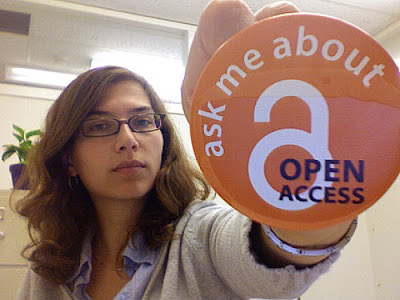Amy Croft
 |
| Image from the iCommons website: http://icommons.org/post-archive/1755 |
This week is the 6th international Open Access Week, an annual event to promote the benefits of open access to the academic and research community. So what better time to discuss its impact on researchers and librarians?
What exactly is Open Access?
Open Access (OA) was defined in the Budapest Open Access Initiative Declaration of 2002 as “free availability on the public internet, permitting any users to read, download, copy, distribute, print, search, or link to the full texts of these articles, crawl them for indexing, pass them as data to software, or use them for any other lawful purpose, without financial, legal, or technical barriers other than those inseparable from gaining access to the internet itself.”
A fantastic starting point for those new to OA is Peter Suber’s overview. The two main options are known as gold OA (publishing in OA journals, sometimes for a fee, which provide free access to the article) and green OA (providing a version of the article to be stored and made available in an OA repository).
Impact on researchers
Having publications freely available online rather than behind a paywall increases the potential for discovery, and thus citations and impact for researchers. Open access allows authors to promote, and directly link to, their research on social media platforms. Sten Christensen of the University of Sydney Library’s Sydney eScholarship Repository has blogged that the most viewed items in the repository were those that the authors promoted using social media such as Twitter, Facebook and blogs. Brian Kelly has observed the same results with his own publications, and recently shared his Top 12 Tips for researchers to maximise the visibility of their work.
Impact on librarians and libraries
Harvard University Library famously advised all faculty members in a memo this year that the increasing costs of subscribing to major periodicals cannot be sustained, and urged them to consider open access options. In an article in the Guardian, Robert Darnton (Director of Harvard Library) said he hoped other universities would follow suit, saying “We all face the same paradox. We faculty do the research, write the papers, referee papers by other researchers, serve on editorial boards, all of it for free … and then we buy back the results of our labour at outrageous prices.”
OA provides a chance to solve the ‘serials crisis’ and make scholarly information available in a more cost-effective way.
Demonstrating our value
 |
|
Ask me about Open
Access: photo by mollyali http://www.flickr.com/photos/mollyali/2924209043/in/pool-38416968@N00/ |
A survey conducted by InTech showed that librarians believe that OA is changing the role of the librarian in the following ways:
o Librarians need to be better integrated with their research
community as a research partner and innovator (96% agree)
o Librarians need to be developing value‐added discovery and
delivery tools (92% agree)
o Librarians should focus on workflow within their institution to
improve efficiencies and enhance collaboration (87% agree)
o Librarians need to find ways to create trusted information
environments (86% agree)
o Librarians need to develop enhanced search and discovery skills
(83% agree)
o Librarians should support authors in relation to rights with
advice on publishing options and agreements (83% agree)
o Librarians should focus on metadata creation and management
(83% agree)
o Librarians need to focus less on being gatekeepers and have
more active involvement in the creation and dissemination of
content (80% agree)
o The role of the librarian should now be focused outward,
promoting the output of their institution worldwide (77% agree)
In other words, this is a wonderful opportunity for libraries to stop being mere warehouses of information, and for librarians to step up and take an active role in the creation, discovery, and use of scholarly information.
Impact on library research
There are still many questions about the costs and benefits of OA, and how it will develop in the future. This provides opportunities for library researchers to play their part in finding some answers.
Check out the research in progress and especially some “research questions in need of researchers” on the Open Access Directory wiki.
Which direction is your institution taking with OA? How do you see it affecting you as a librarian and/or researcher?


Very nice post. I certainly appreciate this site. Keep it
up!
Everything is very open with a very clear clarification of the challenges.
It was definitely informative. Your site is useful.
Many thanks for sharing.